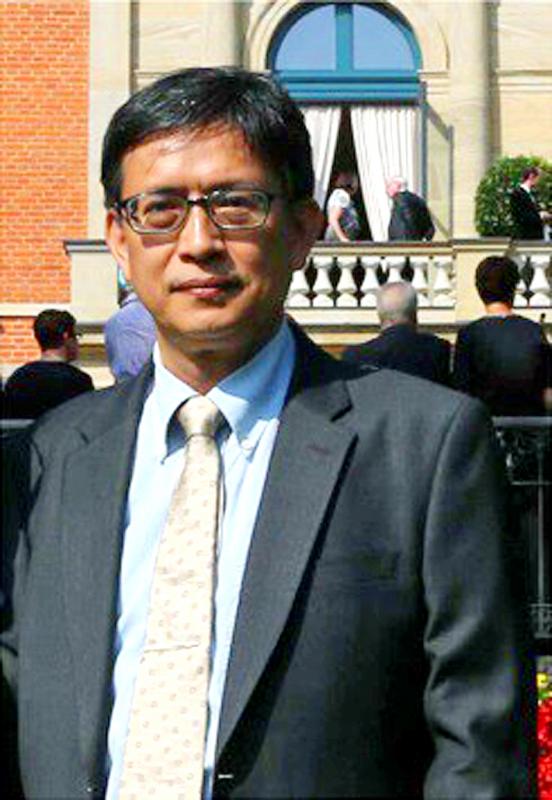Low interest rates contribute to rising house prices and the central bank should take steps to reverse their negative effect on wealth distribution, central bank Deputy Governor Chen Nan-kuang (陳南光) said in an article in the January edition of Taiwan Banker magazine, challenging the central bank’s longstanding stance that low interest rates should not be blamed for rising house prices.
While he agreed that interest rates, income, tax, demographics and inflation expectations all have a bearing on house prices, data at home and abroad show low interest rates do contribute to rising house prices, Chen said.
The link between low interest rates and rising house prices holds true in emerging and advanced economies, regardless of the calculation method, he said.

Photo: screen grab from the Web site of National Taiwan University’s Department of Economics
Loose monetary policy helps bolster house prices by spurring demand, reducing purchase costs, fueling expectations of price increases and encouraging risk-taking, he added.
If the central bank’s low interest rate policy has played a part in fostering demand for property and price increases, it should take action to reverse the negative effect of house price increases on wealth distribution, rather than staying on the sidelines and limiting itself to maintaining the stability of the financial system, Chen said.
Central bank Governor Yang Chin-long (楊金龍) has said fiscal measures are more effective tools in curbing housing price increases and central bank interventions aim to prevent funds flowing to the property market for the sake of financial stability.
Yang has said houses price increases and inflation are “moderate,” but Chen pointed out that house prices surged 262 percent between 2000 and last year, with the real increase exceeding 160 percent after factoring in inflation.
That pace is behind only New Zealand and Sweden, and it surpassed more than 20 other economies, including South Korea, the US, Denmark and Israel, he said, adding that house prices in South Korea and the US increased 45 percent and 64 percent in the past 20 years respectively.
Furthermore, the ratio of house prices to family income confirms deteriorating affordability, he added.
House prices in 2002 averaged 4.5 times household income with the mortgage burden at 24 percent of family income, but spiked at 9.1 times household income in the third quarter of last year, with the mortgage burden at 36 percent, Chen said.
Unaffordable housing has also been top of the public’s grievances list for many years, he said.
It is inappropriate for policymakers to contend that low interest rates have little to do with rising house prices, Chen said, bucking the stance of Yang and his predecessor, former central bank governor Perng Fai-nan (彭淮南).

DAREDEVIL: Honnold said it had always been a dream of his to climb Taipei 101, while a Netflix producer said the skyscraper was ‘a real icon of this country’ US climber Alex Honnold yesterday took on Taiwan’s tallest building, becoming the first person to scale Taipei 101 without a rope, harness or safety net. Hundreds of spectators gathered at the base of the 101-story skyscraper to watch Honnold, 40, embark on his daredevil feat, which was also broadcast live on Netflix. Dressed in a red T-shirt and yellow custom-made climbing shoes, Honnold swiftly moved up the southeast face of the glass and steel building. At one point, he stepped onto a platform midway up to wave down at fans and onlookers who were taking photos. People watching from inside

MAKING WAVES: China’s maritime militia could become a nontraditional threat in war, clogging up shipping lanes to prevent US or Japanese intervention, a report said About 1,900 Chinese ships flying flags of convenience and fishing vessels that participated in China’s military exercises around Taiwan last month and in January last year have been listed for monitoring, Coast Guard Administration (CGA) Deputy Director-General Hsieh Ching-chin (謝慶欽) said yesterday. Following amendments to the Commercial Port Act (商港法) and the Law of Ships (船舶法) last month, the CGA can designate possible berthing areas or deny ports of call for vessels suspected of loitering around areas where undersea cables can be accessed, Oceans Affairs Council Minister Kuan Bi-ling (管碧玲) said. The list of suspected ships, originally 300, had risen to about

A Vietnamese migrant worker yesterday won NT$12 million (US$379,627) on a Lunar New Year scratch card in Kaohsiung as part of Taiwan Lottery Co’s (台灣彩券) “NT$12 Million Grand Fortune” (1200萬大吉利) game. The man was the first top-prize winner of the new game launched on Jan. 6 to mark the Lunar New Year. Three Vietnamese migrant workers visited a Taiwan Lottery shop on Xinyue Street in Kaohsiung’s Gangshan District (崗山), a store representative said. The player bought multiple tickets and, after winning nothing, held the final lottery ticket in one hand and rubbed the store’s statue of the Maitreya Buddha’s belly with the other,

Japan’s strategic alliance with the US would collapse if Tokyo were to turn away from a conflict in Taiwan, Japanese Prime Minister Sanae Takaichi said yesterday, but distanced herself from previous comments that suggested a possible military response in such an event. Takaichi expressed her latest views on a nationally broadcast TV program late on Monday, where an opposition party leader criticized her for igniting tensions with China with the earlier remarks. Ties between Japan and China have sunk to the worst level in years after Takaichi said in November that a hypothetical Chinese attack on Taiwan could bring about a Japanese